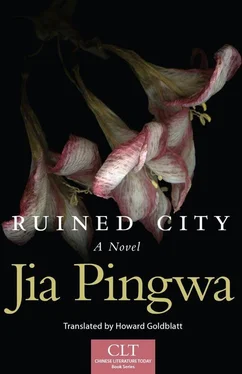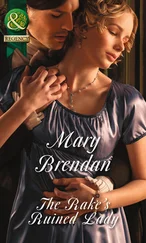After a night of abandonment to sexual pleasure, Zhuang and Tang rose at eight, their faces puffy. They massaged each other’s face before a quick breakfast consisting of a thick spicy soup with meatballs at the Hui People’s Market. Then, pretending to have just rushed over, they sat and talked outside the fence at the temple’s main gate. Inside was the new gate, whose eaves were draped with a horizontal red satin banner that read: “Assumption Ceremony for the Head of the Clear Void Nunnery.” On the spacious steps under the eaves were tables covered with white cloth, on top of one of which was a microphone wrapped in red cloth; two rows of five hard-backed chairs had been placed at the side. Tall pillars were hung with couplets that read: Buddhist thoughts are like clouds; the clouds rise to the mountaintop; the clouds are farther away when you get to the mountain peak / Buddhist teaching is like a moon; the moon is in the water; the moon reflects deeper when you part the surface . A crowd had gathered on the ground at the base of the steps; there were monks in dark robes and Taoist practitioners with topknots, but most were guests and police sent to maintain order. A row of sedans sat beyond the fence. Glancing at the license plates, Zhuang was surprised to see the mayor’s car, and he sighed with admiration over Huiming’s ability. Residents who knew about the celebration but did not have an invitation and a permit to enter sprawled across the fence to peer inside. Vendors selling all sorts of food and sacrificial paper and candles set up stalls in the alleys, where they shouted for customers. Zhuang looked around but did not see Meng Yunfang; he wondered who else Meng had invited. Then he went to buy a string of candied hawthorns, but Wan’er complained that it wasn’t clean. Instead she wanted to eat “mirror cake,” a type of sticky rice cake that had long been absent from the street markets. The vendor was an old man who sat in front of his stove, high atop a canopied three-wheeler that looked more like a peddler’s stand than a moving vehicle. A horizontal board with the name of the snack written in ink was on the canopy, while the slender posts on each side had inscriptions: “Original rice and original juice made with original skill” and “An old family and an old man carry on an old name.”
“Great,” said Zhuang when the old man removed the lid on the steamer to show them two cakes with bamboo sticks in them. “One will be enough. None for me,” he said.
“Oh, so you’re not a lover or a paramour? I’m so sorry,” the old man said. “Then the wife will have one.”
Wan’er gave Zhuang a look, and they both smiled.
“What can you tell us about the cake?” Zhuang asked.
“It’s called a mirror cake because it’s about the size of a hand-held mirror, also symbolizing perfect harmony. During the Tang dynasty, it was a special treat sold at courtesan establishments, and later in the old society it was sold at theater entrances and amusement parks. It’s not so popular anymore, but it’s like drawing a lot: if a couple comes up and buys only one, then the woman must be the wife, a comrade, or a close friend. If a couple buys two, then they must be lovers or paramours. It never fails.”
“But isn’t that incorrect?” Zhuang asked. “With two to form a union, the woman has to be the wife, representing perfect harmony between husband and wife, isn’t that right?”
“Yes. As the ancients said, a wife cannot compare with a concubine, a concubine cannot compare with a prostitute, and a prostitute cannot compare with a secret lover. These days, nine out of ten couples manage to hang on to their marriage. But I’m just joking. Just joking.”
They walked away.
“Why didn’t you buy one and try it?” she said. “Don’t you think we can be together forever?”
“The old man was just wisecracking to get more business. You can’t believe what he says. If you do, then buying only one means that the woman is the wife, and that’s a sign that we’ll be husband and wife in the future.”
She was greatly pleased by what he said. Just then they heard someone calling out to them: “Hey, you two. Out for a stroll?”
Startled, she turned and stepped to the side, as if they were strangers. It was Meng Yunfang.
“What’s taken you so long?” Zhuang said. “I ran into Tang Wan’er at the intersection and told her to get Zhou Min, since you’ve invited us to the ceremony. She said he wasn’t home and she didn’t want to come, but I got her to stick around.” He turned to her: “Wan’er, ask Meng Laoshi if he invited you.”
Knowing what he was getting at, she smiled. “I don’t believe you. Meng Laoshi wouldn’t invite me.”
“I did,” Meng said. “If I’m lying, I’m a dirty dog.”
Soon Li Hongwen and Gou Dahai from the magazine and Dai Shangtian, the book reviewer at the Writers’ Association, showed up on their bikes. They greeted each other before Meng led them to the entrance, where he talked to the police and showed them inside. Being familiar with the temple grounds, Meng told them about the place as they walked along: the flagpoles outside the entrance were from a certain time in the Song dynasty, and the entrance, which faced the gate on the city wall, had excellent fengshui. They passed the entrance and came to a large area with a pond in the center. A fountain in an artificial hill spewed water into the pond. People tossed in coins, saying that good luck would come to anyone whose coin floated on the surface. Wan’er pushed her way through to take a look; she tossed in some coins, but they all settled to the bottom. Unhappily, she reached into her pocket for more, but there were none; she turned to see a yellow banner with long colorful ribbons on each side tied to a flagpole behind the pond. Zhuang was standing there reading the writing on the banner, so she went over to ask him for some coins. With his eyes still on the banner, he struck a match to light his cigarette and told her get some from his pocket. After getting what she wanted, she rested her hand inside his pocket and held his ample penis.
“Stop that! This is a Buddhist spot,” he said.
She gave it a squeeze and it began to harden. “So you’re reverent, are you? Then why are you getting hard?” She laughed and walked off with the coins.
Meng came up and said to Zhuang, “That’s not worth reading. I wrote it myself.” He dragged Zhuang to the rear, as Tang finally kept a coin floating on the surface. But with no one she knew there to cheer her, she pouted and walked off. She was happy to see statues under the veranda on both sides; the Bodhisattvas seemed familiar, but she couldn’t name them, with their pretty faces, round as a full moon, and their soaring brows and graceful eyes.
“Tang Wan’er, are you looking at beautiful statues or are you trying to see if you’re prettier than they are?” Meng called to her.
She ran over looking displeased, but was laughing by the time she reached them.
“You do look like them when you frown,” Meng said, “but that smile is too pretty, it ruins the resemblance.”
“You spout nonsense wherever you are,” she said. “It’s disrespectful.”
“I know more about Buddhism than you do. An ancient master once said that the Buddha is nothing but a dead wooden stake.”
As they talked and walked, Li Hongwen saw Zhuang look into a row of sutra halls and bedrooms. “Are those rooms for the nuns? Do they sleep alone or in pairs?”
“Why do you care how they sleep? Go check in at the reception desk,” Meng said.
Li Hongwen turned to Zhuang and said, “The nuns do sleep together. So, do you think there are lesbians among them?”
Zhuang didn’t reply. A nun walked by, dressed in a long gray robe, looking graceful. Li stuck his tongue out and exclaimed how pretty she looked with her head shaved.
Читать дальше


![Matthew Vincent - [you] Ruined It for Everyone!](/books/216429/matthew-vincent-you-ruined-it-for-everyone-thumb.webp)









